Monday, December 27, 2010
PHOTOS |
COMING SOON|
EXAMINER.COM FILM ARTICLES
||HOME
The Year In Film
2010
Foreign Language Film Took
Flight In U.S. In 2010, With Domestic Efforts Mostly Grounded From Takeoff
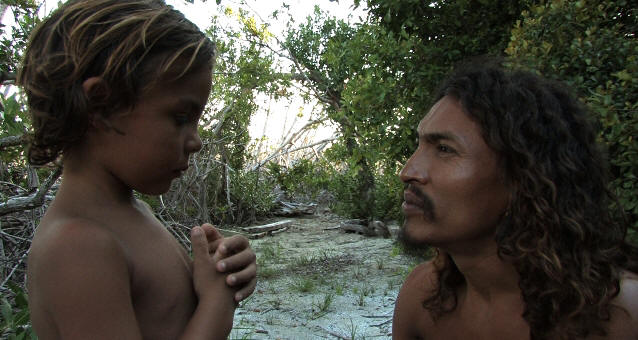
Jorge Machado with his father Natan Machado, in a scene from the film "Alamar",
directed by Pedro Gonzalez-Rubio. The Mexican film was one of many films
from outside the U.S. that made a great impact domestically among moviegoers in
2010.
Film Movement
by
Omar P.L. Moore/PopcornReel.com
 FOLLOW
FOLLOW
Monday,
December 27, 2010
*-correction, in italics
As the world continued to spiral through a harsh recession, the movie year that
was 2010 featured a few great American films, some decent animated features, a slew of impressive foreign
language movies and many incisive, highly entertaining
documentaries.
Of the above categories, foreign language films were (and have been for some
time) a strong presence in American movie theaters in 2010, even if, in many
instances, avid moviegoers had to scour the horizon for an art house theater
miles from home to see one, or wait four months after larger media markets like
New York and Los Angeles enjoyed some of the year's best films. It may be
contradictory to suggest that overseas films were abundant given their strategic
placement in smaller theaters, but consider
"The Human Centipede", a German horror film
directed by Tom Six.
"Centipede", a grotesque film about a sadistic, reprehensible doctor's twisted
fantasy Frankenstein experiment involving a trio of relatively likable souls,
was more an art house horror show than a multiplex movie, even as it played in
about 300 such theaters. Roundly booed by most of America's film critics,
and saluted by this writer for its cinematic decor and Dieter Laser's
performance (as the doctor), Mr. Six's film will surely gain a cult following
now that it has arrived in the U.S. on Blu-Ray.
Yet "Enter The Void", from France's Gaspar Nöe, the master of shock, awe and
controversy in early 21st century cinema, also repulsed some audiences
(including at Sundance, where there were at least 40 walkouts among critics.)
That didn't stop "Void" from receiving critical praise from many including the
New York Times film critic
Manohla Dargis. (The film was edited down
from its two and a half-hour 2009 Cannes edition length.) While moviegoing
audiences may not have taken to it like ducks to water, "Enter The Void" ended
up on a number of prominent critics' ten best year-end lists.
Far East films like "Mother" and "The Housemaid" got plenty of deserved
attention, as did "Vengeance" and "Secret Sunshine". There were a few
misses on the foreign language radar, like Alejandro González Iñárritu's "Biutiful",
but even moderately good films like
"Vincere" and
"I Am Love" made deep inroads, featuring
excellent performances. Bruno Dumont's "Hadewijch" challenged and
compelled.
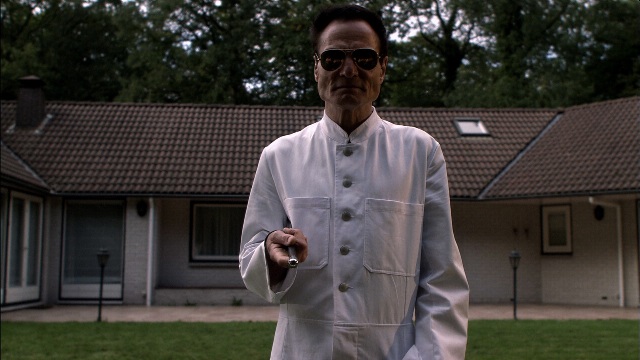

 Top,
clockwise from left: Dieter Laser in "The Human Centipede", Filippo Timi in "Vincere",
a scene from "Fish Tank" and a scene from "Enter The Void".
IFC Films
Top,
clockwise from left: Dieter Laser in "The Human Centipede", Filippo Timi in "Vincere",
a scene from "Fish Tank" and a scene from "Enter The Void".
IFC Films
In any other year, Giovanna Mezzogiorno would undoubtedly be recognized
for her work in "Vincere", as would Filippo Timi for his work in the same film.
The landscape however, was very good in 2010 on a domestic front for women (and
a few men) on the big screen, so the great work in "Vincere" went largely
unnoticed Stateside. Conversely, Tilda Swinton was a widely (and
deservedly) acknowledged virtuoso in Luca Guadagnino's Italian drama "I Am
Love", and even though "Biutiful", the Mexican-made film (opening early next
year) was sub-par, Javier Bardem was outstanding as a man on very shaky ground.
The amazing "A Prophet" was released very late in 2009 but in 2010 America had a
chance (at least some did anyway) to marvel at the phenomenal French film after
it swept the Cesar Awards last March. A revolutionary film in some
respects with its metamorphosis of character and totally absorbing story, "A
Prophet", directed by Jacques
Audiard ("The Beat My Heart Skipped") was a thoroughly compelling and
provoking prison drama with world-class acting by veteran Niels Arestup and
relative newcomer Tahar Rahim.
"Alamar" was one of the best films this year, about a boy and his father bonding
one last time before the boy went off to Milan to live with his mother.
Directed by Pedro Gonzalez-Rubio, this luminous, tranquil and warm-hearted
feature film from Mexico starred real-life father and son Natan and Jorge
Machado. For a change of pace, there was the dynamic and Peckinpah-like
Swedish mystery drama "The Girl
With The Dragon Tattoo", based on the late Stieg Larsson's trilogy of
novels. (The other two films, "The Girl Who Played With Fire" and "The
Girl Who Kicked The Hornet's Nest", also opened this year in U.S. theaters.)
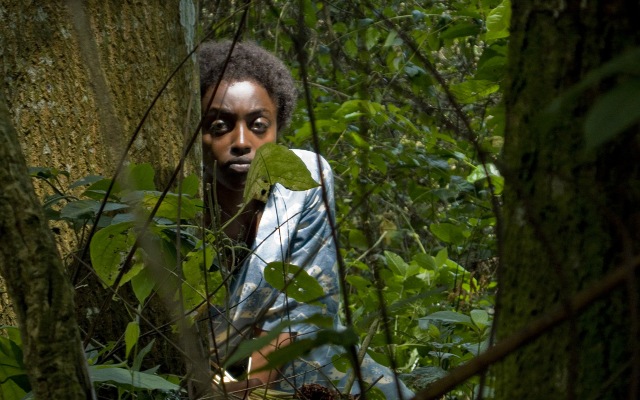
Ruth Nirere, a real-life survivor of the genocide in Rwanda and a singer, gave
one of the year's most incredibly brave and impressive performances in the
Belgian film "The Day God Walked Away", about survival amidst the genocidal war between the Hutus and the Tutsis in Rwanda.
San Francisco Film Society
"Carlos", Olivier Assayas's thoroughly engaging and evolving story of the
real-life Carlos The Jackal was a near-masterpiece, a five and a half-hour
made-for-television epic that featured Edgar Ramirez in the title role, in one
of 2010's best performances, arguably the best acting of a decade that is to end
in six days. The time runs very quickly on a film that is instantly
re-watchable. "Carlos" is about political events he starred in, and not a standard biopic. Argentina's
"The Secret In Their Eyes", directed
by Juan José Campanella,
was an eye-opener as well as an Oscar winner.
There was "White Material" from France, featuring Isabelle Huppert. From
Belgium, there was the extraordinary film "The Day God Walked Away", about
surviving and thriving in Rwanda in 1994 during the height of the genocidal war
between the Hutus and the Tutsis. This amazing film features African
singer and Rwanda war survivor Ruth Nirere giving a performance as great as any
you'll see this decade. The film, the first ever from director Philippe
van Leeuw had its U.S. debut in May at the 53rd San Francisco International Film
Festival.
And then there were some foreign language films remade into English ones, with
mixed results on the big screen. The Swedish horror film "Låt den rätte
komma in" was made into Matt Reeves's indie horror drama "Let Me In", a
gothic-feeling, visually appealing drama featuring good performances and a
tragic love story. Saluted by some critics, it never gained traction
amongst the general public.
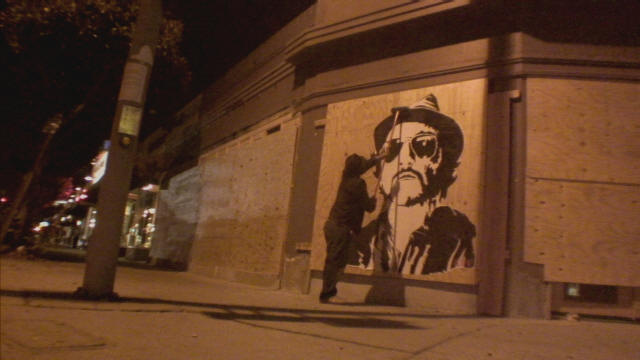
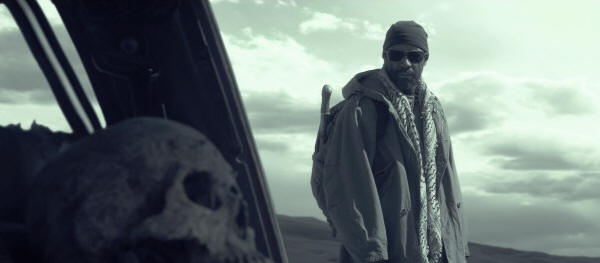
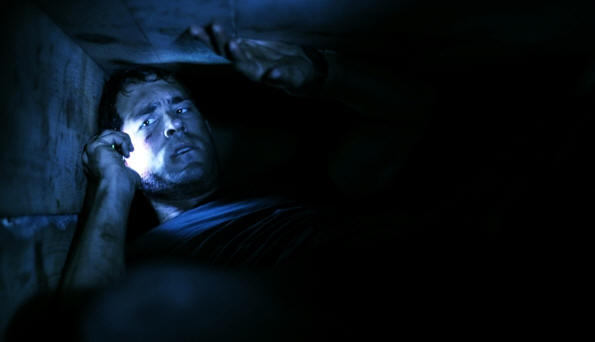
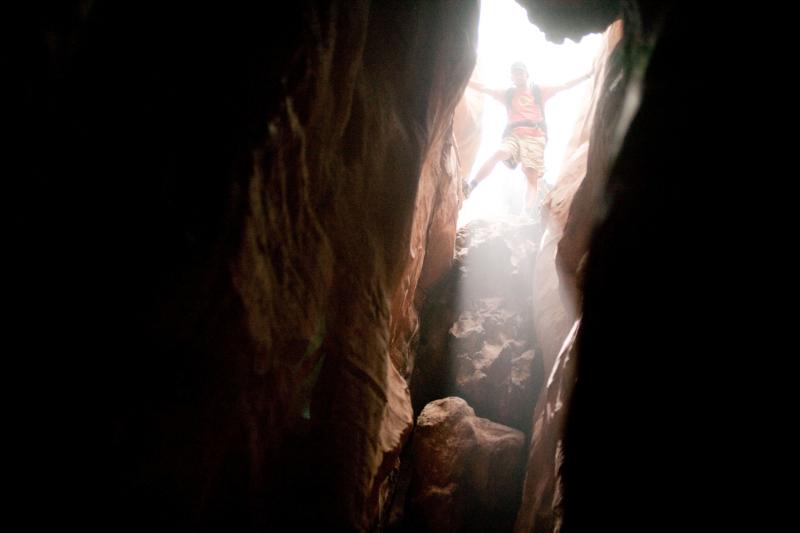 Open
and confined: (clockwise, from top left) - A scene from "Exit Through The Gift
Shop", Denzel Washington in "The Book Of Eli", Ryan Reynolds in "Buried", James
Franco in "127 Hours".
Paranoid Pictures, Warner Brothers, Fox
Searchlight, Lionsgate
Open
and confined: (clockwise, from top left) - A scene from "Exit Through The Gift
Shop", Denzel Washington in "The Book Of Eli", Ryan Reynolds in "Buried", James
Franco in "127 Hours".
Paranoid Pictures, Warner Brothers, Fox
Searchlight, Lionsgate
"Nathalie", a 2003 French film with Gerard Depardieu, about a suspicious wife
who hires a prostitute to seduce and entrap her husband, became
"Chloe" this year, and in the hands of the
normally capable Canadian director Atom Egoyan it was an utter misfire.
Julianne Moore, Amanda Seyfried and Liam Neeson starred. (For that matter,
the very funny 2007 British film "Death Of A Funeral" was remade as the 2010
train wreck starring Tracy Morgan and Chris Rock.)
Some English language films sounded foreign to some American ears but were
irresistible cinema. Australian films
"The Square" and "Animal Kingdom" may have been
difficult for audiences to understand dialogue-wise, but they were fine crime
dramas. Dialects may also have been an issue in films like "Down Terrace",
"Fish Tank",
"The Eclipse" and "Ondine",
but these independents (from England, England and Ireland, Ireland respectively)
made plenty of sense. Each had some unforgettable or unforgivable
characters, making a distinct impression.
So just why was it that 2010 represented an impressive calendar year for foreign
language film? The answers are quite simple. For one, the quality of
those films was hard to deny and easy to admire. The festival circuit was
a factor, as it often is. Much of 2010 was also a year of Hollywood recycling
and pushing out finished films
long-delayed from release ("Daybreakers"*,
"Green Zone",
"I Love You Phillip Morris") and conserving
money in order to promote specific types of big budget films. Warner
Brothers split the new "Harry Potter" in half for profit maximizing (part two
arrives next June). Disney announced that animated films were the only
films it would continue to make.
Succinctly put, the ongoing nightmarish recession forced Hollywood studios to
tighten their belts even more, resisting most remake possibilities or big
sequels. "Spider-Man", however, got the reboot as a franchise from Sony,
with Marc Webb directing. The film will star Andrew
Garfield ("Lions For Lambs",
"Boy A", "Never Let Me Go",
The Social Network"). Tom Cruise and Jeremy Renner got
green-lighted for a fourth "Mission".

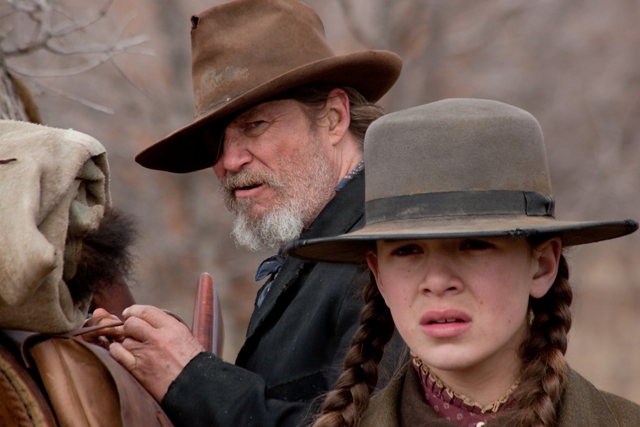
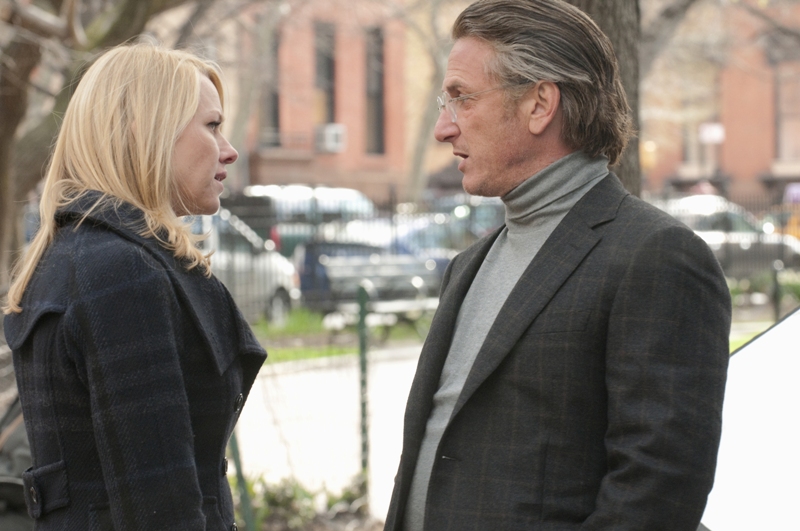
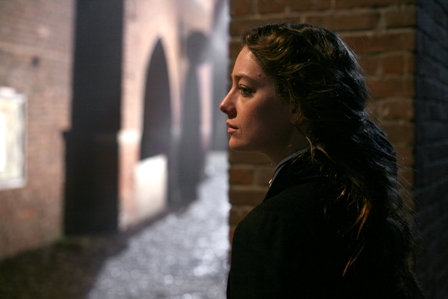
Clockwise from top left: Greta Gerwig in "Greenberg", Hailee Steinfeld in "True
Grit", Giovanna Mezzogiorno in "Vincere" and Naomi Watts in "Fair Game".
Focus Features, Paramount Pictures, IFC Films, Summit
With the severe financial downturn, films this year again reflected the class fissures
and widening gulf between haves and have-nots, and featured the poor aspiring
to climb out of their circumstances. "Another Year", Mike Leigh's
drama,
showed the benign contempt of the lower strata by the upper; "Blue Valentine"
illustrated subtle differences in class between lovers;
"Rabbit Hole" did the same between sisters.
"The Other Guys"
deftly and comically revealed the economic disparity and daylight between
superstar cop jocks and desk jockey cops. Will Ferrell and Mark Wahlberg
supplied the hilarity, until the memorable end credits delivered the cold harsh
truth about where the viewing audience and the country stood. In
"The Fighter", Mr.
Wahlberg convincingly played real-life boxer Micky Ward, chronicling his attempt
to claim boxing glory, and perhaps a simultaneous escape from his working-class
roots, or from his overbearing mother, played by Melissa Leo.
"The Fighter" however, unlike some films, didn't glorify or delight in the idea
that making it by climbing from obscurity or humble roots to glitter and fame
was the triumph or the story in and of itself, as so many films and news
stories do. David O. Russell's film was hardly about rags to riches; it
was an emotional tug-of-war story, a motivational anthem featuring a troubled
older sibling's dedication to encourage and drive his younger brother to achieve
what he himself couldn't.
In domestic films many of the tales of woe were set in Boston, with, among them,
"The Fighter" and "The Town", in which Jeremy Renner resented Ben Affleck's bid to
leave Southie. Mr. Affleck, a Massachusetts man, was also embroiled in
setbacks as a character caught in the recession in "The Company Men", whose
release was delayed to next month.
"Conviction", based on a real-life story of a
waitress who becomes an attorney to free her wrongfully-convicted brother, was
also set in Massachusetts. And how can one forget
"The Social Network", the year's most-lauded
American film?
Its one weakness was its treatment of numerous women characters. None of
the men were likable, either. Class politics were at play in Mr. Fincher's
film too: the middle-class Zuckerberg character inventing a social tool
superseding anything that the fictionalized and upper-class "Winklevi" twins
believed was not only their own, but one that they owned by divine right.
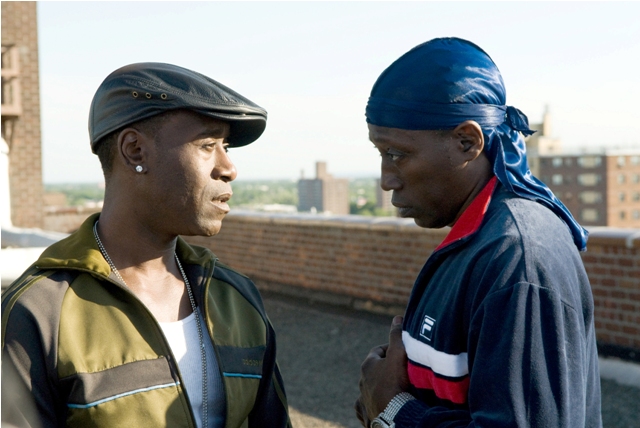
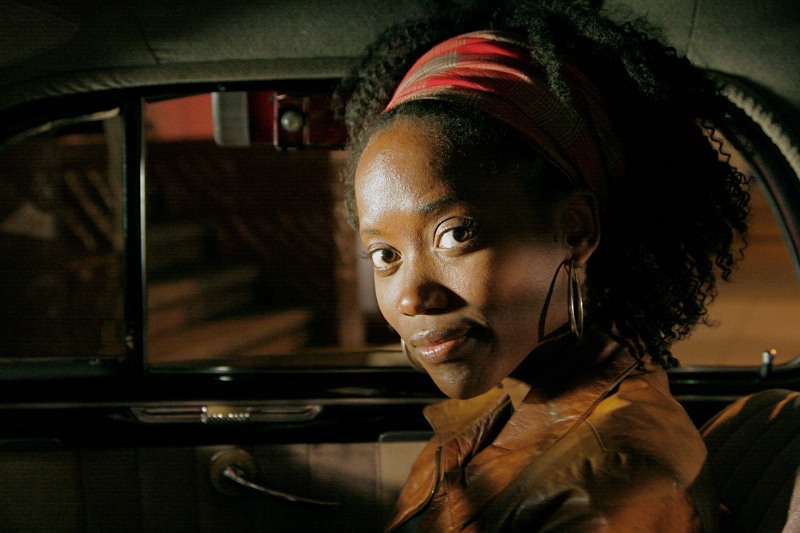
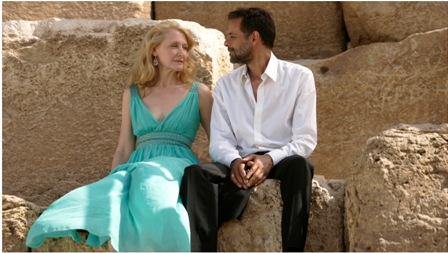
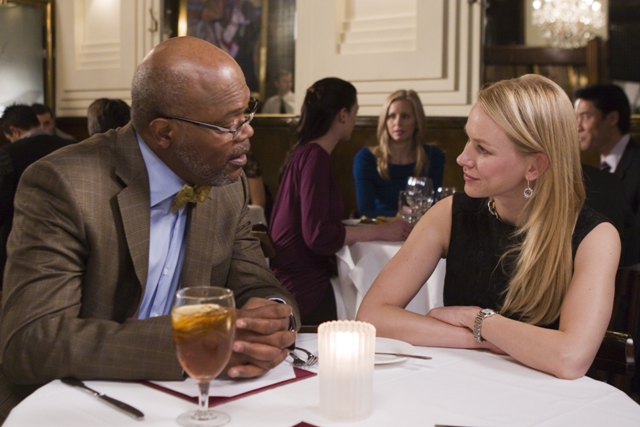
Clockwise from top left: Don Cheadle and Wesley Snipes in "Brooklyn's Finest",
Erika Alexander in "La Mission", Patricia Clarkson and Alexander Siddiq in
"Cairo Time", Samuel L. Jackson and Naomi Watts in "Mother And Child".
Summit, 5 Stick Films, Sony Pictures Classics, IFC Films
Roman Polanski was embattled this year but it didn't stop him from getting his
excellent "The Ghost Writer"
to the big screen. Mel
Gibson self-destructed this year with reprehensible behavior.
His Boston-set film "Edge Of
Darkness" stayed above board.
David Michôd debuted as a feature film director, making the year's best film,
"Animal Kingdom". California's Bay Area-raised
Miller Brothers, twins Noah and Logan, had
never made a film before. Inspired by their late father, they brought
"Touching Home"
to the big screen. Ed Harris was palpable in it as their troubled,
alcoholic
dad.
The 2010 year in film was many things. Overall an unsatisfactory one
compared other years in this closing decade. (The last great film year was
2007.) Many of the best
films in 2010 opened before September. This year at the movies
appeared to be about being boxed in, being poor, and lies. In a film that
represented one of the year's biggest lies,
"Going The Distance", a comedy about a
long-distance romance between a New Yorker and a San Franciscan, was one of the
year's most stylistically claustrophobic films, with no real sense of
established camera shots of the two cities to give audiences an appreciation of
the periphery. Hollywood romantic comedies officially had their funeral in 2010.
("Life As We Know It",
"Valentine's Day",
etc, etc: may you all go softly but ignominiously into the night, and rest in
peace.)
Other cinematic whoppers included the atrocious
"Little Fockers". There was nothing little
about it -- kids or otherwise -- except its humongous childishness and lack of
funny. The
film "Killers" could
have been renamed "Men Who Don't Ask For Directions", as it exploded into
different genres on the turn of a dime, while
"How Do You Know" had to be one of the year's
most mystifying if not illogical titles. (Especially its absent question
mark.) Each of these titles was among the very worst films of 2010, along with
the aptly-named "Cop Out" and both the appalling anti-Muslim, anti-woman,
anti-gay "Sex And The City 2"
and the cringe-inducing, misogynist
"The Bounty Hunter", the latter written by a
woman.
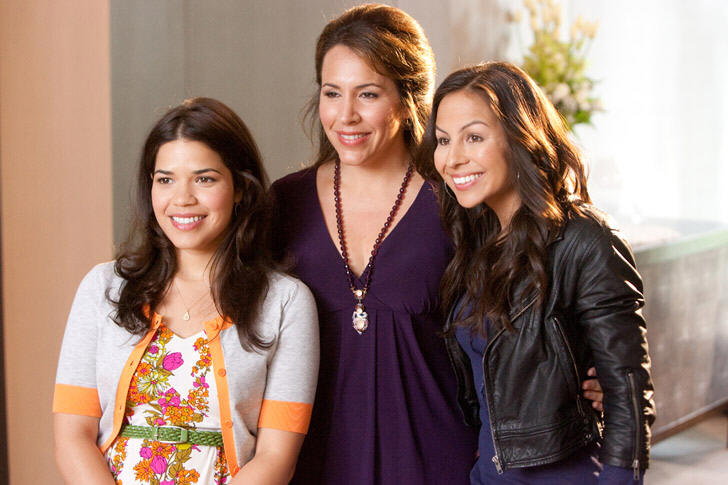
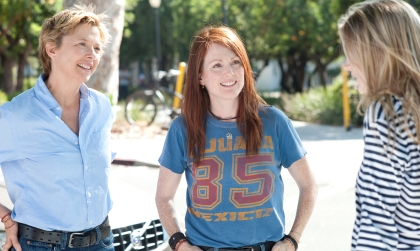
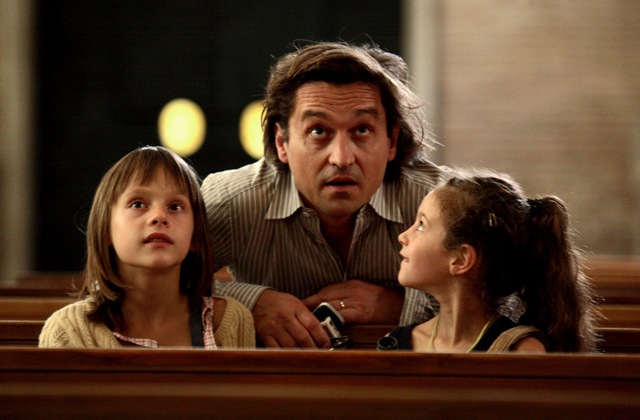
Trios of family: clockwise from top left - The Miller Brothers flank Ed Harris
in "Touching Home", a scene from "Our Family Wedding", a scene from "The Kids
Are All Right", a scene from "The Father Of My Children".
California Film Institute, Fox Searchlight, IFC Films, Focus Features
In the claustrophobia section of this year's cinema supermarket,
"Buried" was
restrictive for a different reason: an impossible situation. Paul Conroy
(Ryan Reynolds) was a private contractor driving a truck for a
U.S. corporation in Iraq. The entire movie was spent in the dark, the main character
trapped in a coffin, arguing on an expiring cell phone while red tape bureaucrats kept him boxed in.
Even in his situation and given this brutal economy Paul would have been better
off being thankful he had a job, even though it was so disturbingly confining.
Another Paul -- Paul Greengrass --
needn't worry about the stability of his directing job, and he advocated a well-appreciated
position via his lead man Matt Damon in the lukewarm "Green Zone", about a U.S.
soldier who questions his own government's policy in Iraq.
In 2010, several disappointments hit the big screen:
"Toy Story 3", whose first seven minutes and
its last seven were its strongest, with a vacant, unspectacular middle;
"Inception", a
well-intentioned, ambitious but finally overblown theater of dreams and their
stolen origins. Mr. Nolan's film deserves plaudits for its wholly original
premise facilitated within a gargantuan Hollywood budget -- a rare thinker's
film within the studio summer rollout and a colossal box-office hit -- but the long,
wearying drama fizzled out, exhausting and finally overstaying its welcome. Worse
yet, "Inception" marginalized the brilliant talents of Marion Cotillard, while
Ellen Page was its lone bright spot.
Another Leonardo DiCaprio film,
"Shutter Island", underwhelmed, as did
"Hereafter", which
felt like prologue, a film that never truly got started at all.
"Due Date"
and "Date Night"
didn't deliver, neither did
"Iron Man 2",
"Paranormal Activity 2",
"Robin Hood", "Alice In Wonderland" or the
overrated faux-reality documentary
"Catfish".
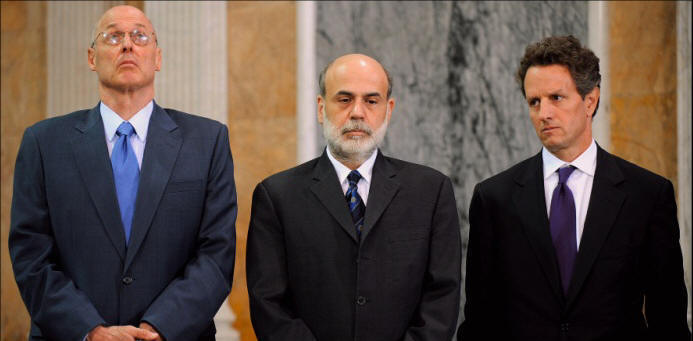
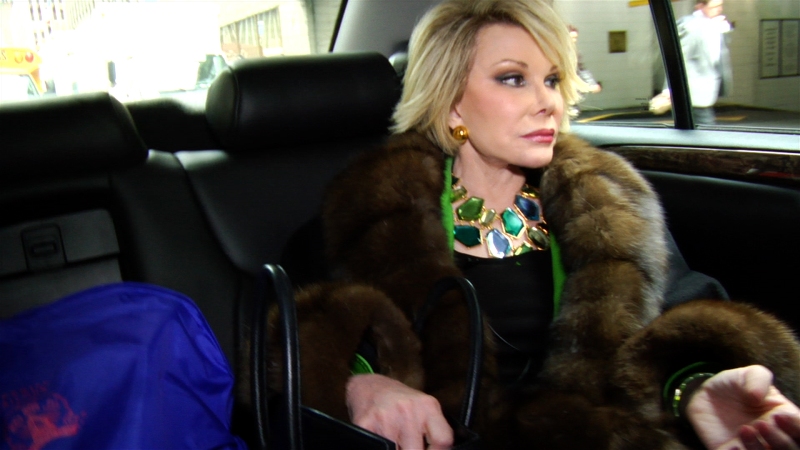
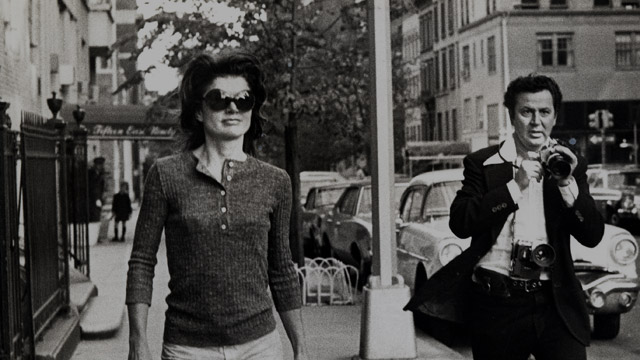
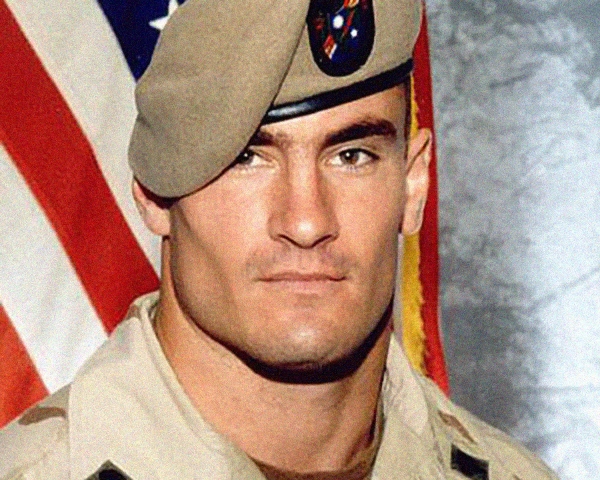
Clockwise from top left: A scene from "Inside Job", Joan
Rivers in "Joan Rivers: A Piece Of Work", Jackie Onassis and Ron Galella in
"Smash His Camera", Pat Tillman in "The Tillman Story".
Sony Pictures Classics, IFC Films, Magnolia, The
Weinstein Company
Real documentaries however, did deliver in 2010.
"Smash His Camera", about the shenanigans of 50-year
celebrity photographer Ron Galella, was a fascinating, laugh out-loud
documentary by Leon Gast about one man's need to document the moves of every
major celebrity you can name.
Speaking of celebrities, Joan Rivers, a source of derision for some, was
revitalized on the big screen in
"Joan Rivers: A Piece
Of Work" by documentarians Ricki Stern and Annie Sundberg. The film was a
triumph for Ms. Rivers and the audiences who howled at her antics and onstage
comedy. "A Piece Of Work" represented an entertaining portrait of the showbiz
world and one woman's battle to stay afloat in it. It was less a
documentary than a confident signature of resilience from Ms. Rivers.
"The
Tillman Story" was a powerful story about a mystery wrapped in a riddle wrapped
in an enigma wrapped up in one big, neat and tidy lie, and Amir Bar-Lev showed
just how vital a documentarian he is, getting moviegoers to open and make up
their minds.
"Inside Job" did a masterful job
at fomenting cinemagoers' ire, clinically putting
the pandemic heist of millions of ordinary persons' financial futures into
devastating perspective. In the process the film's cool, dispassionate and
matter-of-fact retelling of the sordid truth was a reinforcing reminder of the
destructive, life-altering landscape left behind.
All of these documentaries crystallized the locus of fame, infamy, show business
and the idea that 90% of show business was neither show nor business but dirty politics.
Each was fresh. Other documentaries reflected the anxiety and outrage of a country that
had deep skepticism about the future. Some of the documentaries, including
"A Piece Of Work" and "Exit
Through The Gift Shop", were ingenious statements about fame, its
drawbacks and surviving as a person within the rigors of a life labeled
"celebrity".
There were so many more good documentaries including: "Restrepo", "Marwencol",
"Waiting For Superman", "Client
9", "Countdown To Zero",
"Casino Jack And The United
States Of Money" (also a feature film by the late George Hickenlooper),
"The Thorn In My Heart",
"When You're Strange",
"South Of The Border" and "Last Train Home", among others.
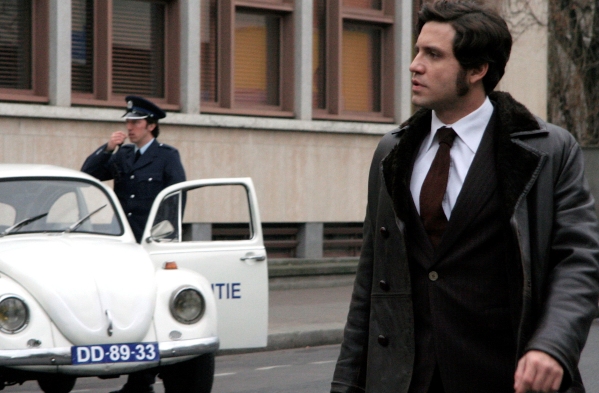

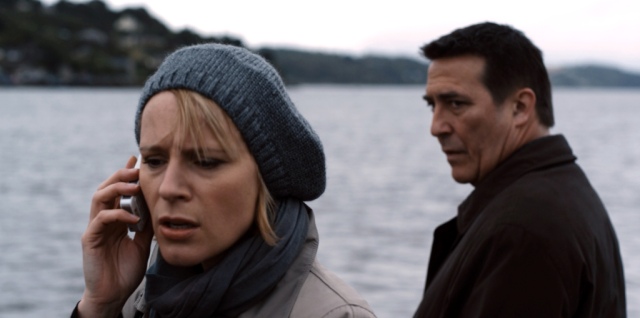
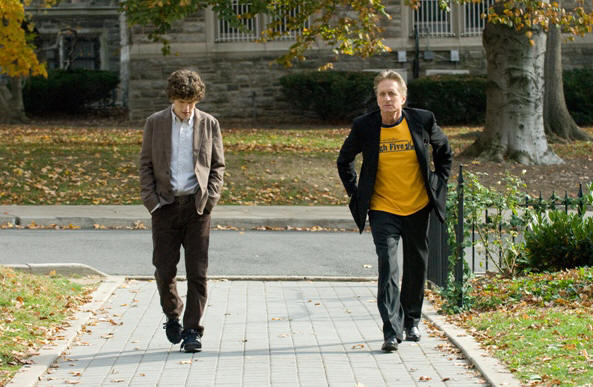
Clockwise, top from left: Edgar Ramirez in "Carlos", The Doors in "When You're
Strange", Jesse Eisenberg and Michael Douglas in "Solitary Man", Iben Hjejle and
Ciaran Hinds in "The Eclipse".
IFC Films, The Doors, Millennium Films, Magnolia Pictures
Most of all though, 3D made its mark for better or worse in 2010. Story
floundered, and painfully -- mostly in animated films. One of the few
fine animated features (and non-3D) was "The Illusionist".
Even more painful in 2010: the dearth of leading black performers on film --
Viola Davis, Denzel
Washington, Tracy Morgan and Queen Latifah excluded -- and the lack of black
films. (The sidekick or lone black friend or assistant was still evident
on the big screen: "Love And
Other Drugs", "Life As We Know It",
"Eat Pray Love" to name a few.) Great
filmmakers like Ava DuVernay and
Barry Jenkins and many others, are out there, with Ms. DuVernay, an
acquaintance, soon to release her film "I Will Follow".
This year, you could count the number of black filmmaking efforts in Hollywood
on two hands: the deplorable "Our
Family Wedding", the forgettable
"Faster", the gritty
"Brooklyn's Finest", the impressive
"The Book Of Eli",
the romantic comedy
"Just Wright" and the dually-disappointing
Tyler Perry films "Why Did I
Get Married Too" and "For Colored Girls". (If there were others
please let me know.
Tanya Hamilton's debut film
"Night Catches Us" was made outside the Hollywood studio system.)
Except for Spike Lee, who made the four-hour
Hurricane Katrina follow-up documentary "If God Is Willing And Da Creek Don't
Rise" (for HBO) and the aforementioned movies, it was a heartbreakingly barren
year for black films in Hollywood.
For everyone on the domestic front, things can only get better film-wise in 2011.
And here's hoping that foreign language films will continue to stay classy next year.
I have a strong feeling they'll be much classier than Ron Burgundy, and that
documentary "I'm Still Here".
 FOLLOW
FOLLOW
SUBSCRIBE TO THE POPCORN REEL MOVIE
REVIEWS RSS FEED
